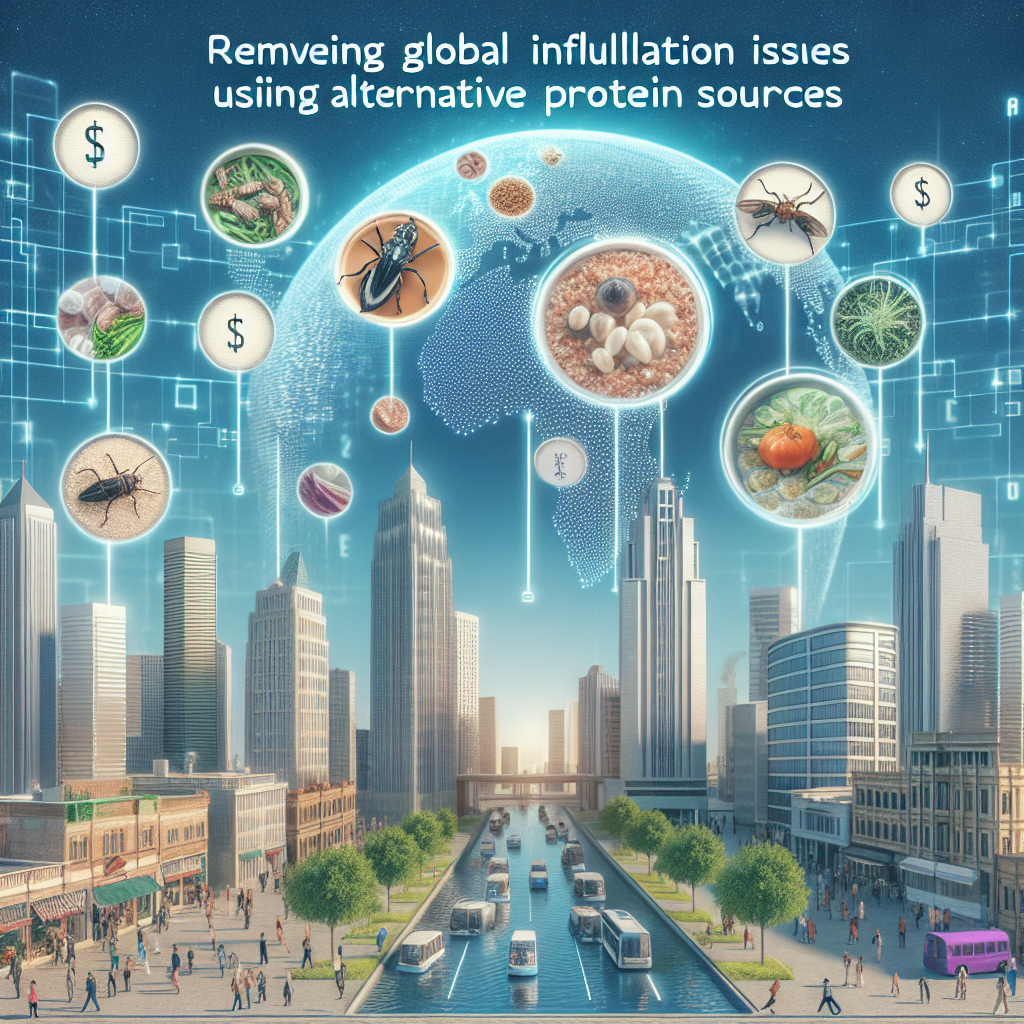Eliminating the Global Inflation Hindrances Via Alternate Protein Sources
-
Table of Contents
- Combatting Global Inflation with Alternative Protein Sources
- Understanding the Inflationary Pressures on Protein Sources
- The Rise of Alternative Proteins
- Plant-Based Proteins
- Insect-Based Proteins
- Algae-Based Proteins
- Lab-Grown Proteins
- Economic Benefits of Alternative Proteins
- Cost-Effectiveness
- Resource Efficiency
- Supply Chain Resilience
- Environmental and Health Implications
- Challenges and Considerations
- Conclusion: A Sustainable Path Forward
- Discover ETprotein’s Range of High-Quality Alternative Proteins
Combatting Global Inflation with Alternative Protein Sources

Inflation has become a pressing global issue, affecting economies and consumers alike. The rising cost of living, exacerbated by the increasing prices of traditional protein sources such as meat and dairy, has led to a search for sustainable and cost-effective alternatives. This article explores how alternative protein sources can help alleviate the inflationary pressures faced by consumers worldwide.
Understanding the Inflationary Pressures on Protein Sources
The demand for protein is on the rise, driven by a growing global population and increased awareness of the health benefits associated with a protein-rich diet. However, traditional animal-based proteins come with high production costs and environmental concerns, contributing to their inflated prices. Factors such as feed prices, energy costs, and supply chain disruptions further exacerbate the situation, leading to a significant impact on the affordability of these proteins.
The Rise of Alternative Proteins
Alternative proteins, derived from plants, insects, algae, and lab-grown sources, have emerged as viable substitutes to traditional animal proteins. These sources not only offer environmental and ethical advantages but also present an opportunity to mitigate inflation by providing more cost-effective protein options.
Plant-Based Proteins
- Pea Protein
- Rice Protein
- Soy Protein
- Hemp Protein
Insect-Based Proteins
- Cricket Protein
- Mealworm Protein
Algae-Based Proteins
- Spirulina
- Chlorella
Lab-Grown Proteins
- Cultured Meat
- Fermentation-Derived Proteins
Economic Benefits of Alternative Proteins
Alternative proteins offer several economic benefits that can help combat inflation. Their production often requires fewer resources, such as land and water, and they can be produced closer to the point of consumption, reducing transportation costs. Additionally, advancements in technology have led to increased scalability and reduced production costs over time.
Cost-Effectiveness
Studies have shown that the cost of producing plant-based proteins is significantly lower than that of animal proteins. For example, producing one kilogram of pea protein is estimated to be considerably less expensive than producing the same amount of beef protein.
Resource Efficiency
Alternative proteins are more resource-efficient, requiring less feed and water to produce the same amount of protein as animal sources. This efficiency translates into lower production costs and, consequently, more affordable prices for consumers.
Supply Chain Resilience
Alternative protein sources are less susceptible to supply chain disruptions that can lead to price volatility. Their production can be more easily scaled and adapted to changing market conditions, providing a more stable supply and pricing.
Environmental and Health Implications
Beyond economic considerations, alternative proteins offer environmental and health benefits. They generate lower greenhouse gas emissions and require less land, contributing to a more sustainable food system. From a health perspective, many alternative proteins are rich in essential nutrients and can be produced without antibiotics or hormones, addressing public health concerns associated with traditional animal farming.
Challenges and Considerations
Despite the potential benefits, there are challenges to the widespread adoption of alternative proteins. Consumer acceptance, taste preferences, and regulatory hurdles must be addressed to ensure these proteins can effectively compete with traditional sources. Additionally, investments in research and development are necessary to improve the taste, texture, and nutritional profile of alternative proteins.
Conclusion: A Sustainable Path Forward
Alternative protein sources present a promising solution to the global inflation challenges posed by traditional animal proteins. By offering cost-effective, environmentally friendly, and nutritious options, they have the potential to reshape the protein market and provide relief to consumers facing inflated food prices. As technology advances and consumer acceptance grows, alternative proteins are poised to play a significant role in building a more sustainable and resilient food system.
Discover ETprotein’s Range of High-Quality Alternative Proteins
ETprotein is at the forefront of providing alternative protein solutions that cater to the needs of a diverse market. Their product lineup includes:
- Organic Rice Protein
- Clear Rice Protein
- Pea Protein
- Clear Pea Protein
- Watermelon Seed Protein
- Pumpkin Seed Protein
- Sunflower Seed Protein
- Mung Bean Protein
- Peanut Protein
- L-(+)-Ergothioneine (EGT) in various grades
These products are non-GMO, allergen-free, and feature a neutral taste, making them ideal for a wide range of applications. Whether you’re in the nutraceutical, pharmaceutical, cosmeceutical, veterinary, or food and beverage industry, ETprotein offers tailored solutions to meet your protein needs.
About ETprotein:
ETprotein, a reputable protein and L-(+)-Ergothioneine (EGT) Chinese factory manufacturer and supplier, is renowned for producing, stocking, exporting, and delivering the highest quality organic bulk vegan proteins and L-(+)-Ergothioneine. They include Organic rice protein, clear rice protein, pea protein, clear pea protein, watermelon seed protein, pumpkin seed protein, sunflower seed protein, mung bean protein, peanut protein, and L-(+)-Ergothioneine EGT Pharmaceutical grade, L-(+)-Ergothioneine EGT food grade, L-(+)-Ergothioneine EGT cosmetic grade, L-(+)-Ergothioneine EGT reference grade and L-(+)-Ergothioneine EGT standard. Their offerings, characterized by a neutral taste, non-GMO, allergen-free attributes, with L-(+)-Ergothioneine purity over 98%, 99%, cater to a diverse range of industries. They serve nutraceutical, pharmaceutical, cosmeceutical, veterinary, as well as food and beverage finished product distributors, traders, and manufacturers across Europe, USA, Canada, Australia, Thailand, Japan, Korea, Brazil, and Chile, among others.
ETprotein specialization includes exporting and delivering tailor-made protein powder and finished nutritional supplements. Their extensive product range covers sectors like Food and Beverage, Sports Nutrition, Weight Management, Dietary Supplements, Health and Wellness Products, and Infant Formula, ensuring comprehensive solutions to meet all your protein needs.
As a trusted company by leading global food and beverage brands and Fortune 500 companies, ETprotein reinforces China’s reputation in the global arena. For more information or to sample their products, please contact them and email sales(at)ETprotein.com today.












